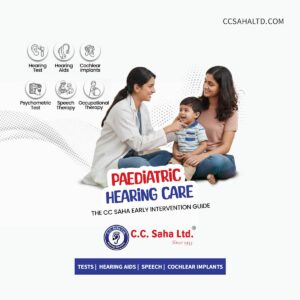
Paediatric Hearing Care
Early intervention is the key to paediatric hearing care. Learn how CC Saha Ltd. combines audiology, speech therapy, and occupational therapy for success.
Many people experience stigma to discuss hearing loss with their family. For some, hearing loss is linked to vulnerability, making them feel self-conscious or embarrassed. They worry about being seen as weak or dependent, which can erode their sense of self-worth.
Often, there is a lack of awareness, understanding, and empathy about hearing loss. Family members may not fully grasp the challenges and impact it brings, leading to unintentional insensitivity or dismissal. This lack of empathy can discourage open discussions.
Hearing loss leads to communication barriers. This communication barrier makes the issue even more difficult to address.
Despite the challenges, discussing hearing loss with family is essential. It’s a daunting task, but starting this conversation can lead to better understanding and support. If needed, seek help from the person you trust most.
How about a short story?

Facing the speaker and maintaining eye contact is a fundamental strategy to improve listening skills, especially if you have hearing loss. Here’s why it’s crucial and how to incorporate it into daily interactions.
Importance of Facing the Speaker and Maintaining Eye Contact
How to Implement This Tip
Background noise can profoundly impact effective listening, especially for those with hearing loss. It competes with the speaker’s voice, making comprehension challenging. Quiet surroundings are essential for clear communication, whether in an office, social setting, or at home. Simple strategies can significantly improve listening skills, experience and communication.
Importance of Minimizing Background Noise
How to Implement This Tip
Assistive listening devices (ALDs) and noise-cancelling hearing aids are essential for individuals with hearing loss. They amplify sound, reduce background noise, and enhance the clarity of conversations in noisy environments, making it easier to understand and engage. These devices provide vital support to improve listening and reduce listening fatigue.
Importance of Using Assistive Listening Devices and Noise-Cancelling Hearing Aids
How to Implement This Tip
Active listening is a communication technique where you fully concentrate, understand, respond, and remember what’s being said. It involves giving your complete attention to the speaker, focusing on both verbal and non-verbal cues, and refraining from interrupting or judging. By engaging in active listening, you foster mutual understanding, build trust, and encourage meaningful dialogue, leading to more effective problem-solving and stronger relationships.
Importance of Practicing Active Listening
How to Implement This Tip
Asking for clarification is crucial in communication to ensure mutual understanding. It involves seeking additional information or explanations when something is unclear. By requesting clarification, you demonstrate active engagement and a commitment to accurate comprehension, which fosters effective communication and prevents misunderstandings.
Importance of Asking for Clarification
How to Implement This Tip
Expanding your vocabulary improves communication, making interactions more engaging and persuasive. It also aids comprehension of complex texts and conversations.
Importance of Improving Your Vocabulary
How to Implement This Tip
Taking breaks during long conversations helps maintain focus and clarity. It allows participants to refresh their thoughts, prevent mental fatigue, and regroup before continuing. This practice promotes more effective communication by ensuring that all parties can articulate their thoughts coherently throughout the discussion.
Importance of Taking Breaks during Long Conversations
How to Implement This Tip
Stretch or walk briefly to refresh mentally and physically
Listening exercises involve structured activities designed to improve listening skills. These exercises focus on various aspects such as comprehension, attention to detail, and interpreting non-verbal cues. They help individuals become more adept at understanding spoken language, enhancing their ability to engage actively in conversations and meetings.
Importance of Engaging in Listening Exercises:
How to Implement This Tip:
Visual aids, such as charts, graphs, and diagrams, enhance communication by providing visual representations of information. They help clarify complex concepts, improve understanding, and make presentations more engaging and memorable. Visual aids appeal to different learning styles, reinforcing verbal messages and facilitating better retention of information.
Importance of Using Visual Aids:
How to Implement This Tip:
Maintaining a healthy lifestyle encompasses practices like regular exercise, balanced nutrition, adequate sleep, and stress management. It supports overall well-being, boosts energy levels, and enhances cognitive function, which is essential to improve listening skills and productivity. A healthy lifestyle also fosters resilience against illnesses and promotes mental clarity, contributing to better decision-making and interpersonal relationships.
Importance of Maintaining a Healthy Lifestyle:
How to Implement This Tip:
Listening is a skill that can always be refined, regardless of your current hearing ability. At CC Saha Hearing Clinics, we dedicate ourselves to improve listening skills of our patients, with practical guidance and cutting-edge hearing solutions. By integrating these tips into your daily life, you can enhance your listening capabilities and remain engaged with your surroundings. If you’re facing challenges with hearing loss, seek expert assistance promptly to explore the supportive technologies and solutions tailored to your needs. Effective listening not only enriches your experiences but also nurtures meaningful connections in your life. Visit us today to prioritize your hearing health and communication wellness.
At C.C. Saha Ltd., we provide a comprehensive range of hearing solutions that include the testing of a patient’s ability to detect tones at different frequencies. Our highly skilled Audiologists conduct a thorough examination, taking into account the patient’s hearing loss history, lifestyle choices, and needs, and then recommend the best possible hearing solution.
We are present across the city of Kolkata, at Esplanade, Prince Anwar Shah Road, Dunlop, Salt Lake, and Barasat. We also have clinics at Midnapore and Burdwan.

Early intervention is the key to paediatric hearing care. Learn how CC Saha Ltd. combines audiology, speech therapy, and occupational therapy for success.

As we welcome 2026, it is time to prioritize ear health. Explore our guide on making impactful hearing resolutions for the New Year, from annual testing to upgrading your devices.

At CC Saha Ltd., excellence in hearing care meets a legacy of compassion and expertise. As the best hearing aid centre in Kolkata since 1933, the brand continues to make hearing comfortable, easy, and life-changing for every generation.

CC Saha Ltd delivers the best cochlear implants in Kolkata and Eastern India, specializing in various types and guiding patients through every stage of the cochlear implant journey.

Early detection of hearing loss can define a child’s ability to communicate, learn, and connect with the world. Paediatric hearing tests are designed to identify hearing challenges at the earliest stages, often before a parent even notices a concern. From new-born OAE and ABR screenings to playful conditioned audiometry in toddlers, these specialized tests ensure accurate results in a child-friendly way.

The benefits of hearing aids go far beyond better hearing—they transform lives by improving communication, emotional health, and cognitive vitality. From reconnecting with loved ones to regaining confidence in social and professional settings, hearing aids restore the joy of sound in every moment. With advanced technology that adapts to individual environments, they offer clarity, comfort, and control. Discover how embracing modern hearing solutions through CC Saha Ltd. can help you experience the life-changing benefits of hearing aids today.
#ListeningSkills #EffectiveCommunication #ImprovementTips #ActiveListening #EmpatheticListening #CommunicationSkills #MindfulListening #ListeningComprehension #CommunicationTips #PersonalDevelopment #CCSahaHearingClinics #HearingAids #Noise-Cancelling #CCSahaLtd #CCSaha1933

